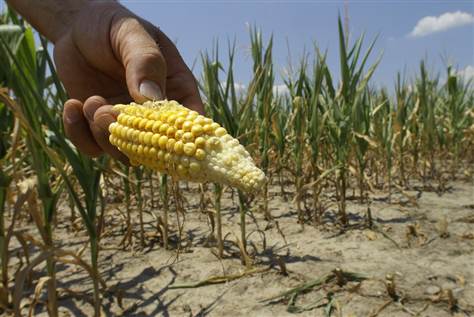
Severe drought shows stupidity of corn ethanol mandate
If you haven’t noticed from the frostbite-inducing air conditioning in your office yet, it’s been hot this summer. Really really hot–and dry. In fact, more than half of the counties in the country have now been labeled “disaster areas” by the Department of Agriculture. James Hansen, a leading scientist for NASA, along with lots of other scientists, are saying these crazy temperatures and massive droughts are due to anthropogenic climate change, which means we’ll only see more extreme weather like this in the future.
So in a time when unpredictable weather and heatwaves are becoming the new norm, is it sensible or safe to build an energy sector based on water-and-weather-dependent crops? Absolutely not. Unfortunately, that’s just what President Obama’s administration and the ethanol lobby are doing by supporting the Renewable Fuel Standard, our federal mandate for biofuel use in the U.S.
Federal policies that force large amounts of corn out of the food supply and into ethanol production are coming under increasing scrutiny this summer– and for good reason. Last week, 156 House members sent a letter to EPA Administrator Lisa Jackson requesting a reduction in the corn ethanol mandate.
Mandates to use corn as fuel exacerbate rises in food prices
The Renewable Fuel Standard exacerbates food insecurity and hunger in times of low corn supplies, like during droughts and other weather extremes. When there’s not enough corn to go around to meet our food and fuel needs, corn prices shoot up and consumers are stuck with the cost. Additionally, corn ethanol production degrades the environment by causing water pollution, soil erosion, and more greenhouse gases than regular gas, and fails to provide a stable or sustainable alternative to oil. As corn prices continue to spike, Congress has a responsibility to rein in federal policies that support this risky and polluting fuel.
In 2012, the Renewable Fuel Standard mandates the use of 13.2 billion gallons of corn ethanol — forcing more than 40 percent of the dwindling U.S. corn crop into ethanol production. Meanwhile, the worsening drought is beginning to impact corn prices — they’ve spiked upwards of 50 percent since June. When corn prices rise, so do the prices of products that rely on corn. The USDA predicts increases in domestic prices of beef, dairy products and eggs ranging from 3 to 5 percent through 2013. Moreover, globally, the U.S. is the largest exporter of corn. Rising food prices will hit people in developing countries that rely on imports of our grains most severely. Higher grain prices in the U.S. are already triggering global food price spikes that parallel those seen in the 2008 global food crisis.
By shrinking the supply of corn for our food system, the Renewable Fuel Standard will continue to push corn prices higher. After the global food crisis of 2008, the World Bank pinned expanded biofuels production as one of the single biggest factors in pushing up food prices. Institutions from the World Trade Organization to the National Academy of Sciences have similarly criticized ethanol expansion for contributing to food price volatility. Looking ahead, a July 2012 study by the New England Complex Systems Institute warned that the drought and record-high temperatures experienced this summer are “poised to trigger an imminent global food crisis” and recommended that lifting mandates to convert corn into ethanol could help avert it.
Corn is a polluting, environmentally harmful source of fuel — especially as climate change hits home
The drought underscores the inability of the corn ethanol industry to provide the U.S. with a safe, secure source of energy. Although we’re using almost half our corn for ethanol, biofuels only account for 10 percent of our transportation fuel and already place undue stress on our food system and environment. When corn yields fall like they have this year, the corn ethanol mandate prioritizes fuel over stable food prices and environmental sustainability. Several studies, including a recent one by the National Academy of Sciences, have found that the RFS — 95 percent of which is currently met by corn ethanol — is increasing air pollution and greenhouse gas emissions, degrading water sources and damaging biodiversity.
The problems associated with using crops for fuel will likely intensify in the future. “Stronger, more intense, and longer-lasting drought” will result from a warming climate, concludes Kevin Trenberth, a senior scientist at the National Center for Atmospheric Research. In the Midwest, scientists predict climate change will make persistent droughts more likely over the next 20 to 50 years. In the new normal of accelerating climate change, corn yields are likely to remain erratic. Research published in the journal Nature Climate Change by Noah Diffenbaugh, an assistant professor at Stanford University, found that the combination of climate change impacts and biofuels mandates present the most significant threat to corn price stability over the next few decades.
While climate change makes corn ethanol an unstable energy source, corn ethanol production makes climate change worse. The EPA’s data shows that most corn ethanol production actually causes more greenhouse gas emissions than gasoline.
Congress and the Obama administration can take action to reform the corn ethanol mandate
In the short term, the EPA needs to reduce the volumes of corn ethanol mandated by the Renewable Fuel Standard to ease the environmental and economic harm caused by corn ethanol production. In the longer term, Congress needs to seriously reform the RFS and reexamine all federal support for polluting biofuels that threaten the environment, food security and public health.
Related Posts
Ways to Support Our Work

Read Latest News
Stay informed and inspired. Read our latest press releases to see how we’re making a difference for the planet.

See Our Impact
See the real wins your support made possible. Read about the campaign wins we’ve fought for and won together.

Donate Today
Help power change. It takes support from environmental champions like you to build a more healthy and just world.